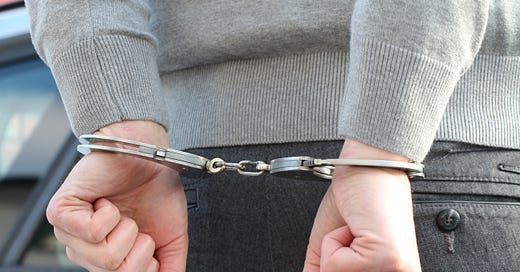One of the perks of my job is that I get a glimpse at the crimes law students have committed before they enrolled in law school. I teach a law school clinic, which means that students need to disclose their past misdeeds to me before I decide whether they can be trusted to work on real world cases as student attorneys.
Educational privacy prevents me from sharing the colorful details of some of the capers that have been told to me, which is a shame. Sometimes I’ve learned how a student got disciplined in high school, and my honest reaction has been: Oooh, I wish I’d done that.
But more commonly I find out how many law students drank too much in their freshman in year in college. I find out who has a DUI on their record. And, less commonly, something more serious. For example, a few of our students have suffered from the opioid crisis, like so many others in our country. But nearly all of the disclosures can be summed up as follows: Between the ages of 17 and 22, people do some dumb s—t.
The students who must confess these things to me are usually about to enter their third year law of law school. They are, by any objective measure, wildly successful young professionals . But they are also usually just a few years removed from that DUI or whatever else they confessed. “It’s really embarrassing,” I have been told, more than once. In the extreme cases, my students have told me inspiring stories of redemption, of how they pulled themselves out of some dark places. More commonly, it’s about a bright person in his or her mid-twenties who just grew up.
I’ve been thinking about these student disclosures over the last few days, since all House Republicans and 48 Democrats approved the so-called Laken Riley Act. As drafted, the Act will indefinitely detain immigrants who have merely been arrested or accused of shoplifting, even just once, even years in the past, and even if they were never convicted. Even if they have a letter signed by the District Attorney and the Chief of Police saying, “this person is innocent,” this law would lock them up.
Immigrants, unlike most of my students, are not given the chance to redeem themselves from mistakes. Not even from small ones. There are lots of other, albeit less extreme, examples of this in our immigration laws and policies. While having a DUI on one’s record is not a bar against enrolling in law school and becoming a successful attorney, a single DUI has always been an exclusion from the DACA program. Although, to be clear, the Obama-era rules governing DACA require an actual conviction for DUI, not a mere arrest. How woke!
While MAGA tends to be hostile to any non-white group of immigrants, the majority of Americans and most Democratic elected officials can be somewhat supportive of immigrants, including undocumented immigrants. But not if immigrants make mistakes. Ever. People have a notion in their mind that there are good immigrants and bad immigrants. Once an immigrant has even a minor brush with the criminal justice system, she becomes one of the bad ones.
The perceived line between good immigrants and bad immigrants is going to be extremely important as Trump takes office. We can already see that when Republican politicians are pushed on what “mass deportation” might mean, they fall back on trying to connect immigrants with crime. They know that deporting immigrants who have been living for years in the United States and who don’t have any criminal record - the “good” ones - will be more politically perilous.
For now, Trump has been able evade this problem because he’s not in office yet. For now, he and his allies can just talk in fantasy terms about how they are going to do a mass deportation of millions, and they will all be criminals. The math doesn’t add up, but right now no one is forcing the President-election to do that kind of accounting. We are still at the Just Talk stage.
If Trump were to actually focus on only deporting immigrants with some taint of crime — even if only an old shoplifting arrest — I suspect he’d probably find a lot of support, for better or worse. But then he will not do a mass deportation. There just aren’t enough immigrants who have been arrested for anything.
When Trump took office in 2017, one of the first things he did was reject the idea that ICE should prioritize the deportation of people with criminal records. Trump is likely to do the same thing again by the end of this month. Tom Homan, Trump’s incoming “Border Czar” loves to say that all undocumented immigrants should be afraid, which means the vast majority of immigrants who have never been arrested or charged with anything.
Once the media and the public fully understand that Trump is going after the “good” immigrants, the politics are likely to change. We have to hope so, anyway. But even this hope accepts a depressing reality in which immigrants are deprived of the chance to be fundamentally imperfect. To do stupid s—t. And then, like everyone else, to grow up.




